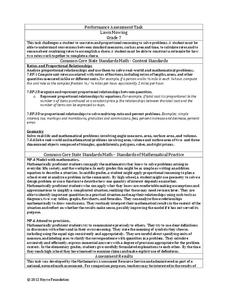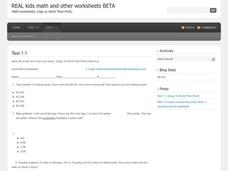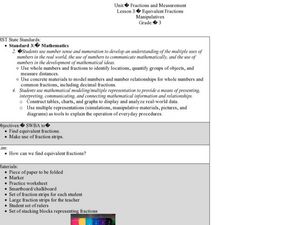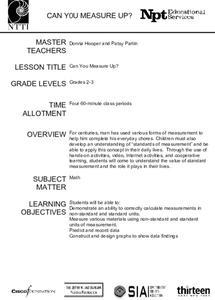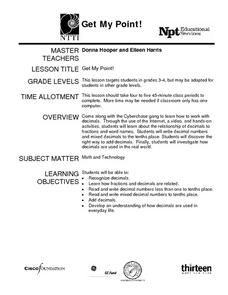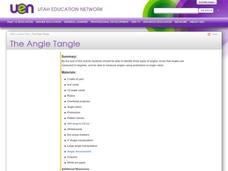EngageNY
Choice of Unit
Explore using units with scientific notation to communicate numbers effectively. Individuals choose appropriate units to express numbers in a real-life situation. For this 13th lesson of 15, participants convert numbers in scientific...
EngageNY
Describing the Center of a Distribution Using the Median
Find the point that splits the data. The lesson presents to scholars the definition of the median through a teacher-led discussion. The pupils use data lists and dot plots to determine the median in sets with even and odd number of data...
Noyce Foundation
Lawn Mowing
This is how long we mow the lawn together. The assessment requires the class to work with combining ratios and proportional reasoning. Pupils determine the unit rate of mowers and calculate the time required to mow a lawn if they work...
Noyce Foundation
Building Blocks
Building blocks have more uses than simply entertaining children. Young mathematicians calculate the volume of a given cube, and then calculate the volume and surface area of a prism formed from multiple cubes.
Curated OER
Leaf Patterns
First graders explore the existence of patterns in everyday items. In this science and math integrated lesson, 1st graders match leaves with a name word card and organize them into four patterns. This lesson includes a reading of And the...
Curated OER
Fractions and Recipes
Learners, working with their parents in real world situations, calculate to complete three word problems associated with multiplying and dividing fractions.
Curated OER
Exploring Geometric Figures
Tenth graders explore mathematics by participating in hands-on daily activities. Learners identify a list of different shapes and classify them by shape, size, sides and vertices. They utilize tangrams and geometric pieces to gain...
Curated OER
Estimate Quotients
Fifth graders have to use division to solve problems in everyday situations. This worksheet on estimation and division has students practice these skills using real-life examples. The worksheet is part of the Houghton Mifflin math series...
Curated OER
Primary Counting Skills
Class members drill and practice counting skills from 1 to 20. They count along with a puppet and when the puppet makes a mistake, they correct it. In pairs, they connect cubes to make a train and count the number used. On the last of...
K12 Reader
Basic Geometry Terms
Set your pupils up to start on geometry by teaching them some introductory terminology. Pupils learn the terms by reading a short passage and looking at examples. They then respond to five questions related to the text.
Henrico County Public Schools
Models for Teaching Addition and Subtraction of Integers
Positive and negative numbers are everywhere in the world around us. Whether it's charged particles in atoms, a hot air balloon rising and falling in the sky, or a series of bills and checks being delivered in the mail, this...
Curated OER
Math Word Problems
For this problem solving worksheet, students solve six multiple choice word problems that involve finding probability and identifying monetary amounts.
Curated OER
Percents: What's the Use?
Learners explore percentages in real world situations. In this percents instructional activity, students determine the final sales price after discounts. Learners interview community members and determine how percentages are used in the...
Illustrative Mathematics
Making Cookies
Hooray for chocolate chip cookies! Ask your mathematicians to triple a chocolate chip cookie recipe and then reduce the recipe by one-fourth. Your class may need two days to complete, tripling the recipe the first day and reducing the...
Curated OER
Fair Haven Community and the Grand Avenue Bridge
Students use the internet to research the history of Fair Haven, Connecticut. In groups, they are introduced to the socio-economic developments and how the area has grown over time. They work together to create their own bridge design...
Curated OER
Right Angles
In this math worksheet, students learn to recognize a right angle. Students study the picture of the right angle and are asked to draw 3 examples. Students then find and draw 9 examples of right angles in objects around them.
Curated OER
Equivalent Fractions Manipulatives
Students study fractions. For this equivalent fractions lesson, students utilize fraction strips to enhance their understanding of equivalent fractions. They watch a demonstration and then work independently with their own set of...
Curated OER
Can You Measure Up?
Here is a well-designed lesson plan on common standards of measurement for your young mathematicians. In it, learners calculate measurements in standard and non-standard units. They make predictions, record data, and construct and design...
Curated OER
Get My Point!
Here is one of the better lessons I've come across on how to teach fractions and decimals. This lesson does a great job of showing how these two mathematical representations of numbers are interrelated. Some excellent websites, printable...
Curated OER
Earth Day Number Sense
Elementary schoolers count and order objects using numbers 1-300. They bring recyclable items from home. Students group the items, skip count by 2's, 3's, and 5's, and arrange the items on a number line. Recyclable plastic bags are put...
Utah Education Network (UEN)
Candies R Us
A box is fun to make, especially when it's a candy box! These activities help to cement understanding of the difference between surface area and volume. Have individuals measure the surface area of their box in two-dimensions before...
Curated OER
Angles
Fourth and fifth graders investigate angles and name them according to the criteria for obtuse, acute, and right angles. They examine a human-made yarn pattern on the floor of their classroom and identify angles, vertices, and types of...
Curated OER
Visualizing Multiplication
Upper graders represent multiplication of a two-digit number by a two-digit number as the area of a rectangle with dimensions of the two factors. They find patterns for the number of different base ten blocks in a rectangle representing...
Curated OER
Marriage and Financial Goals, Budgeting Strategies
There is no more useful life skill to learn than budgeting and setting financial goals. It's math that is used by every person, everyday. Learners examine the responsibilities and costs involved in family economics. Through a series of...
Other popular searches
- Everyday Mathematics
- Math in Everyday Life
- Everyday Math Skills
- Everyday Math Grade 5
- Everyday Math Number Sense
- Everyday Math Fourth Grade
- Everyday Math Grade 2
- Grade 1 Everyday Math
- Everyday Mathematics Arrays
- Algorithms in Everyday Math
- Everyday Math 3
- Everyday Mathematics Review


